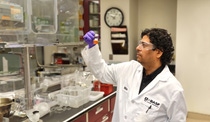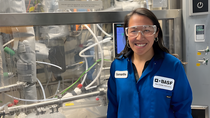Media
The science behind developing effective medication: Nitin Swarnakar

At an early age, Nitin Kumar Swarnakar became interested in science and the workings of the human body. He first thought of becoming a doctor, however, his passion for understanding how medicine acts on the body led him to pharmaceutical sciences. After completing his bachelor's, master’s and Ph.D. and working for a number of pharmaceutical companies in India, he decided to emigrate to the United States. He went on to complete his postdoctoral training at the University of Connecticut (UConn), the University of Cincinnati (UC) and the Western University of Health Sciences (WUHS).
Swarnakar joined BASF in 2019 and supports customers in the development of higher-quality pharmaceutical solutions and provides his expertise and know-how to make the process smoother.
What exactly does BASF Pharmaceutical Solutions do?
At BASF Pharma Solutions, we do not develop pharmaceutical drug products; we improve them by providing innovative solutions and technologies by means of our excipients. A drug is a chemical substance with a therapeutic effect on the body. However, the drug cannot be administered alone, which is why formulators have developed dosage forms, such as tablets, capsules, injections, or topical applications by using excipients.
Excipients are traditionally inactive substances crucial to achieving the highest quality product and improving the delivery of the drug, commonly known as an active pharmaceutical ingredient (API), into the body. They ensure that APIs are stable and effective. A 5mg antihypertensive or antihistamine drug contains only a small amount of API. However, the size of the tablet is increased because of other components that help deliver the API into the body: excipients.
What is your current role at BASF?
As Manager of the Applications Laboratory in North America, I supervise the team in charge of developing and characterizing pharmaceutical dosage forms and other delivery technologies by using BASF products. My role involves managing the staff and resources, overseeing formulation and development activities, analyzing the data generated in the lab, and sharing the information with our customers. My team also offers direct training to customers, technical service and sales managers in North America. We are a high-impact team consisting of two scientists and collaborate across the organization and the regions to provide innovative solutions and a positive customer experience.
How do you typically engage with customers?
We often invite customers to the lab, show them the facility and the lab capabilities, and services we provide. Sometimes their scientists need training on advanced technologies, so we develop the expertise in our lab, and we showcase the overall data and how we have developed this technology. This gives them an idea about how to develop and use this technology among their R&D teams.
The solutions we develop require thousands of experiments. Our customers take that particular formulation we developed and apply it to their API to enhance the overall effectiveness of the medicine.
Collaboration with our customers can expand anywhere from a day to a few years. We aim to improve need-based drug delivery strategies to support them. They normally come back asking for our assistance and expertise.
We also provide support within prototype formulation development, where customers can produce a wish list of what they would love their product to be, and we help them turn that wish list into reality. For this reason, we must be at the top of our game in order to meet their overall requirements.
What is the self-emulsifying drug delivery system (SEDDS)?
Solubilization is an important issue in pharma because around 70% of active pharmaceutical ingredients (API) are not soluble in water. We use solubilization technologies to help increase the bioavailability of drugs, allowing the body to absorb more of the drug than it would if it were taken in an insoluble form.
BASF offers two main technologies when it comes to solubilization: one is the amorphous solid dispersion, and the other is the lipid-based drug delivery system–also known as the self-emulsifying drug delivery system (SEDDS)–which we have developed.
A big part of SEDDS is finding the right combination of three main components: oil, surfactant and co-surfactant. After conducting varying experiments, we’ve developed a series of compositions with different properties. You can use those properties to solubilize the API. So, we provided these sets of formulations, evaluated them and found them to be very effective.
Sometimes, a customer comes to us asking for help in finding the right set of formulations for the API they’ve developed. For those cases, we developed an in-vitro and in-vivo correlation method. In-vitro means you are developing something in the lab, and now based on the data, you can predict the in-vivo (or actual) performance in the human body. So, our customers developing can now see how their development performs.
Now customers can use ten types of SEDDS formulations in their lab for their API, do experiments to rank the formulation, decide which formulation will go further and select the best ones for their API.
What are the most challenging aspects of your role?
The biggest challenge is to remain up to date with the latest trends and regulatory requirements in the pharmaceutical industry. We must follow the latest trends, learn about the new science, what is coming and see how to utilize our functional excipients to support applications.
The pharmaceutical industry is the highest-regulated market in the U.S. because of its direct impact on humans. The U.S. Food and Drug Administration (FDA) oversees the quality of the drug, the therapeutic effect it provides and the safety of the dosage form. So, understanding what is happening in the industry is key.
At the same time, technology evolves rapidly. So, if a new technology is coming, we must know all about it to develop expertise that supports it. For example, earlier in the COVID pandemic, I led and coordinated an international task force with the purpose of identifying opportunities to contribute to the development of potentially life-saving medicines and vaccines to fight the virus. The task force included BASF employees from every region, as well as global marketing and technical marketing.
We found a number of these therapeutics where BASF has the expertise and the products in our portfolio to support development and production. During that time, BASF had supported the development of 83 therapies by providing crucial ingredients, 40 of which were globally realized therapies including COVID-19 test kits.
About BASF Pharma Solutions
BASF Pharma Solutions produces innovative excipients and active ingredients of outstanding quality and performance. With a global team of industry experts and digital solutions, such as Virtual Pharma Assistants, BASF supports its customers in developing efficient, cost-effective and reliable formulations.
Learn more about BASF Pharma Solutions
For media inquiries and questions, please contact: molly.birman@basf.com
